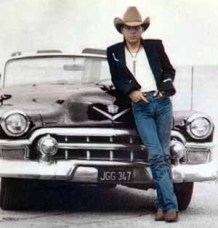The first time Dwight Yoakam’s “Guitars, Cadillacs” came on the radio, I was driving through eastern Montana and it was the perfect soundtrack. That was 1986 and it was getting played pretty often, though not as often as his version of “Honky Tonk  Man,” and as soon as I got home I ran out and bought the album, which had one of my favorite titles of all time: Guitars, Cadillacs, Etc., Etc.
Man,” and as soon as I got home I ran out and bought the album, which had one of my favorite titles of all time: Guitars, Cadillacs, Etc., Etc.
A few months later Dwight made his Boston-area debut at a small club called Nightstage, drawing an impressively mixed crowd of old-line country fans in work shirts who’d driven down from New Hampshire and green-haired punk rockers who’d probably never been to another country show.
Dwight was impossibly thin and edgy, in skin-tight cowboy duds, with Pete Anderson playing brilliant honky-tonk guitar and Brantley Kearns in overalls, sawing away at the fiddle. “This next song, it’s what I call ‘High Jones’; ‘Orthodox Jones,'” Dwight announced before singing “The Grand Tour.” “The radio programmers say this kind of stuff is too country, that it’ll offend their audience — well, come on, Brantley, let’s offend  somebody!” He sang the old George Jones weeper like he believed every word, then introduced “one by the Hillbilly Cat — you know who the Hillbilly Cat was?” And tore up Elvis Presley’s “Little Sister.” It was one of the hottest shows I’ve ever seen.
somebody!” He sang the old George Jones weeper like he believed every word, then introduced “one by the Hillbilly Cat — you know who the Hillbilly Cat was?” And tore up Elvis Presley’s “Little Sister.” It was one of the hottest shows I’ve ever seen.
I was reviewing for the Boston Globe that night — I’m not sure why I got the assignment, since there were at least three other Globe critics there, at least three of whom outranked me — but anyway I was in the newsroom, typing it in on deadline, and Susan Wilson wandered by. Susan was one of my favorite writers, a sharply witty lesbian who wore gold cowboy boots — and her sexual preference is relevant because when I asked how she’d liked the show, her three-word review was: “I’d fuck him.”
So he was terrific, and then a year or so later his second album came out, with this song on it. And around the same time Smithsonian Folkways brought out their Vision Shared album, a tribute to Woody Guthrie and Lead Belly, with everyone from Taj Mahal to Bruce Springsteen to Willie Nelson on it, and another Globe writer was writing a feature story about the enduring power of the American folk tradition and the new generation of folksingers, like Suzanne Vega… and I said, “Have you heard Dwight Yoakam’s new album?”
 He said, “No, why?”
He said, “No, why?”
I said, “Because he’s from Kentucky and writes songs about coal miners and is a lot closer to Woody than Suzanne Vega will ever be…”
And he said, “But Dwight Yoakam’s a country singer; I’m writing about folk music.” Or words to that effect.
I probably went on arguing, because I was even more pigheaded then than I am now — which is going some — but in retrospect the conversation was already over. Anyway, I learned this song and still think its one of Dwight’s best and fits well into Woody’s tradition.
